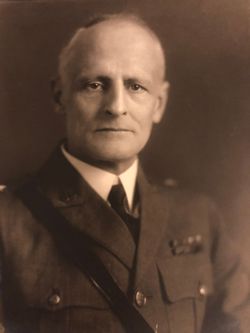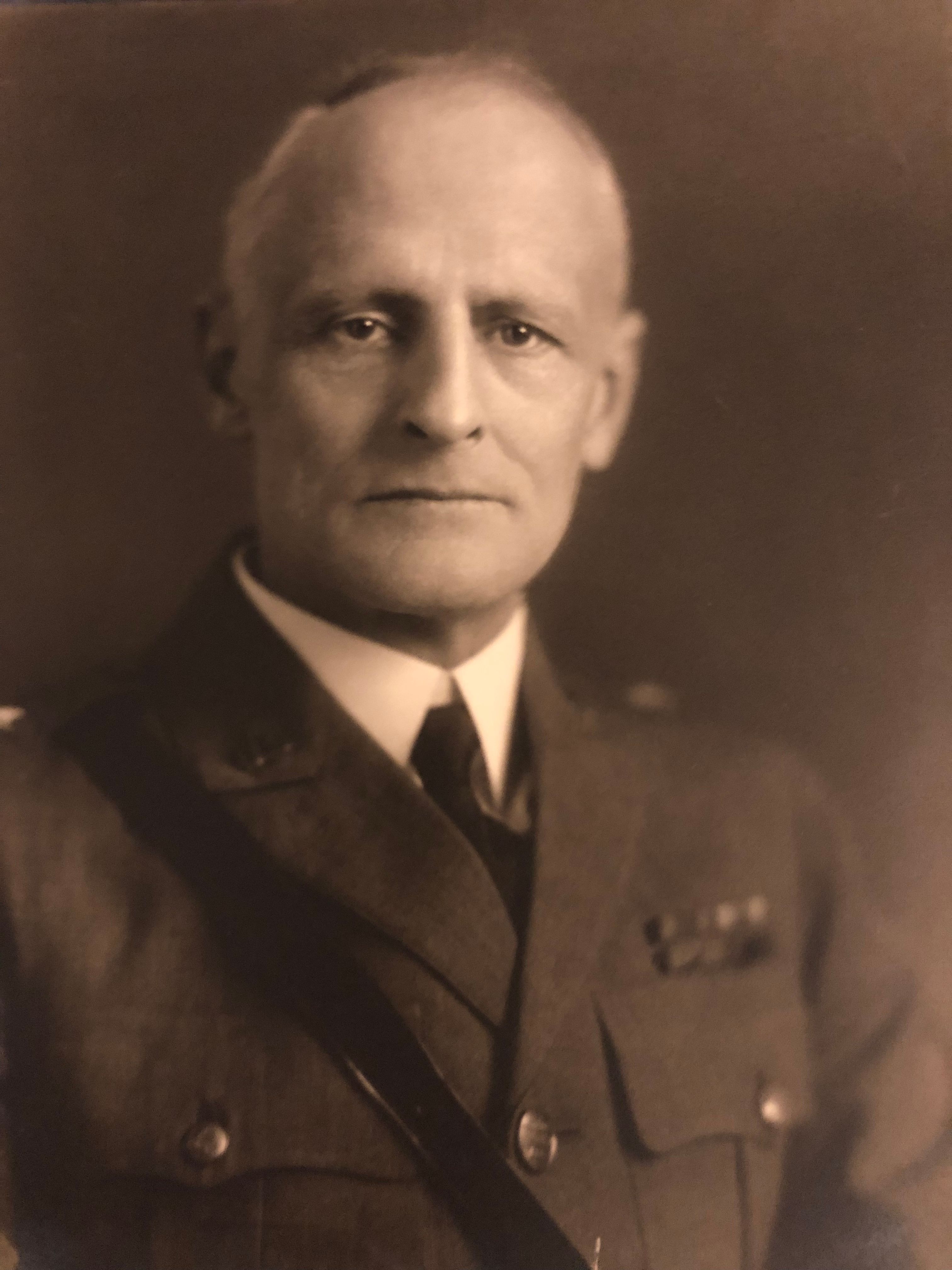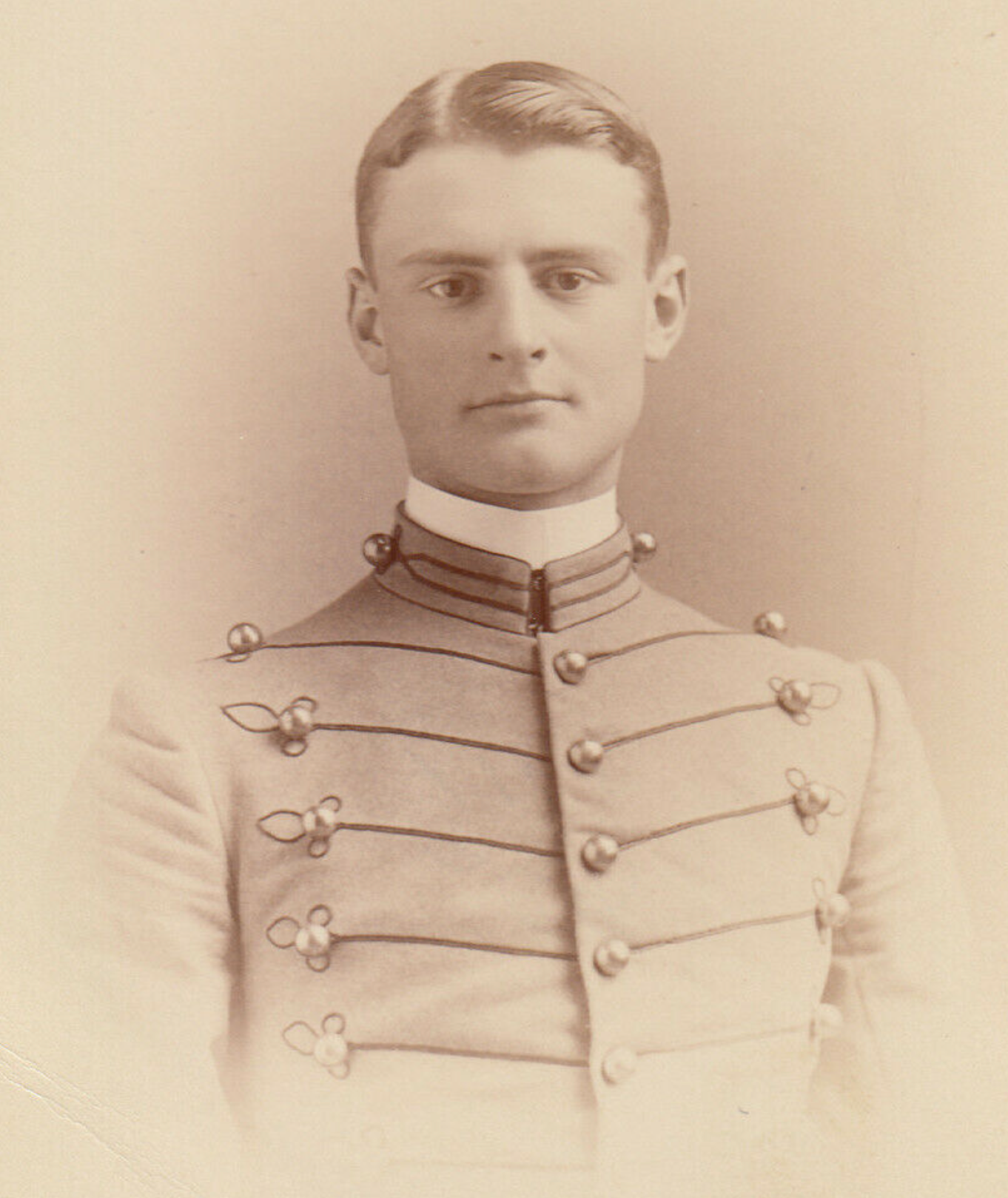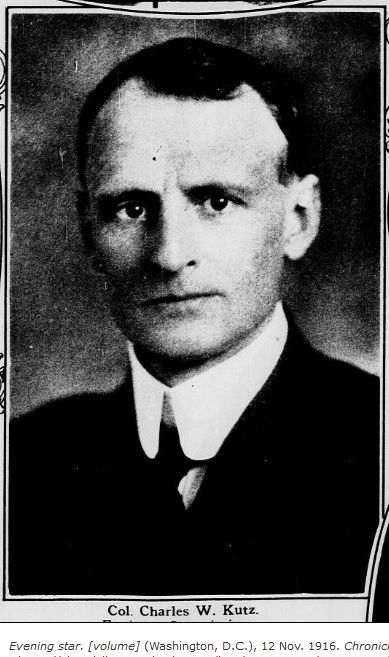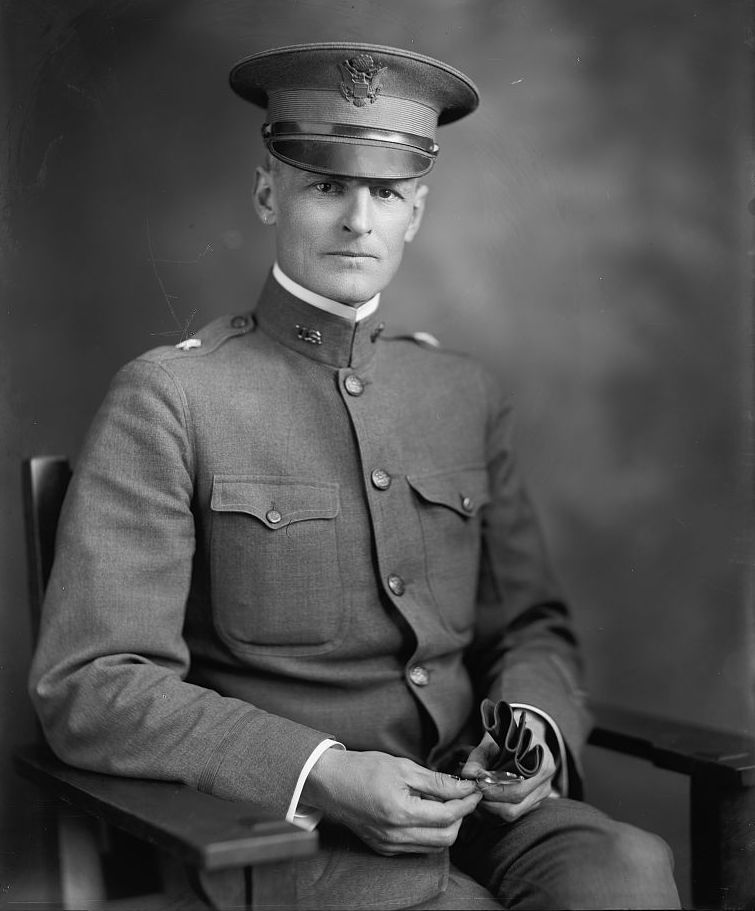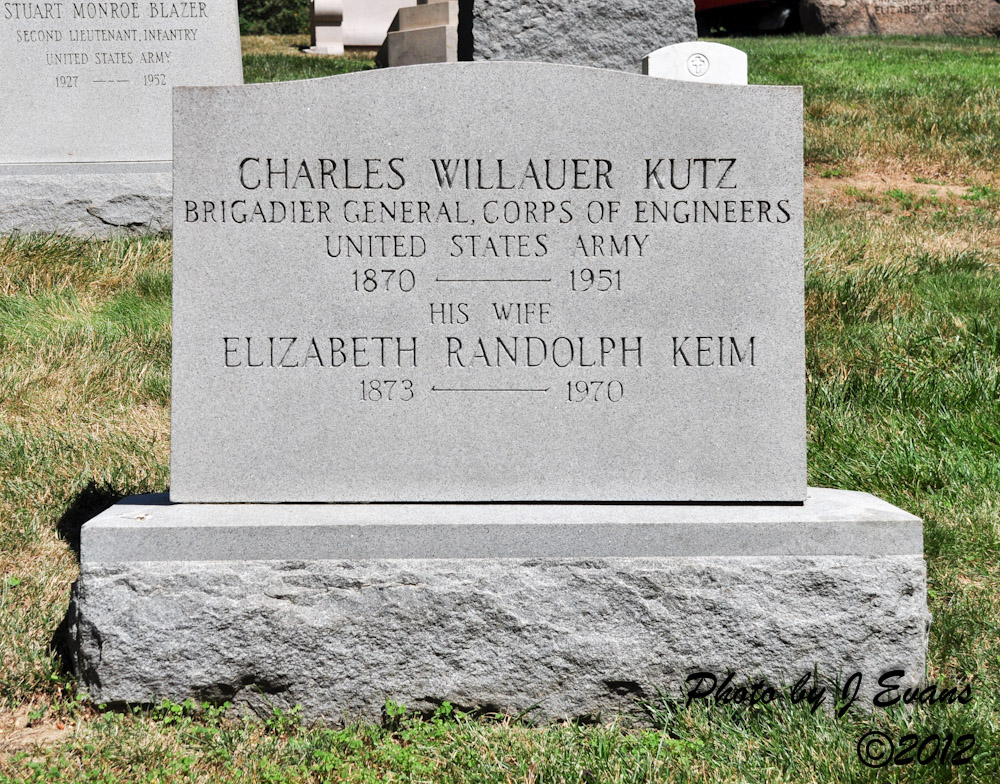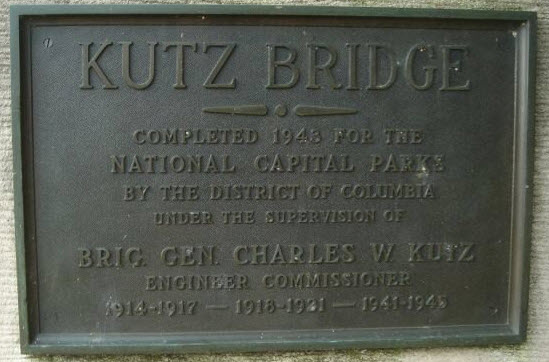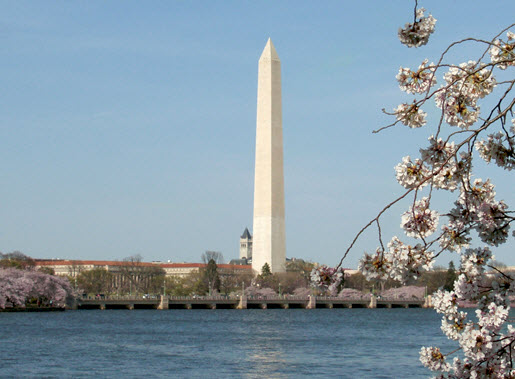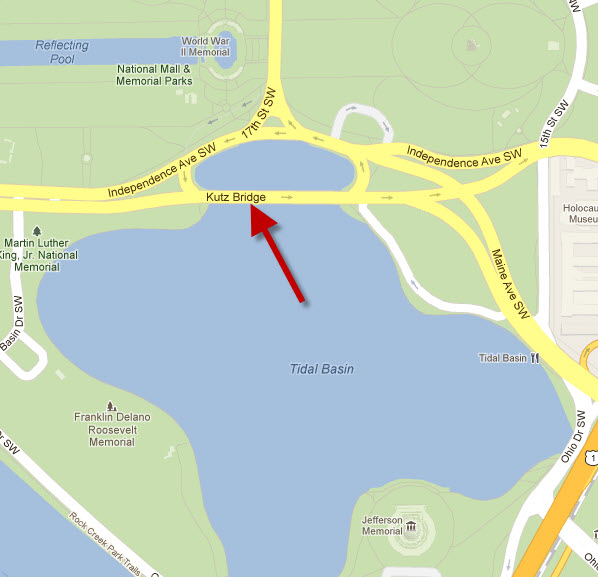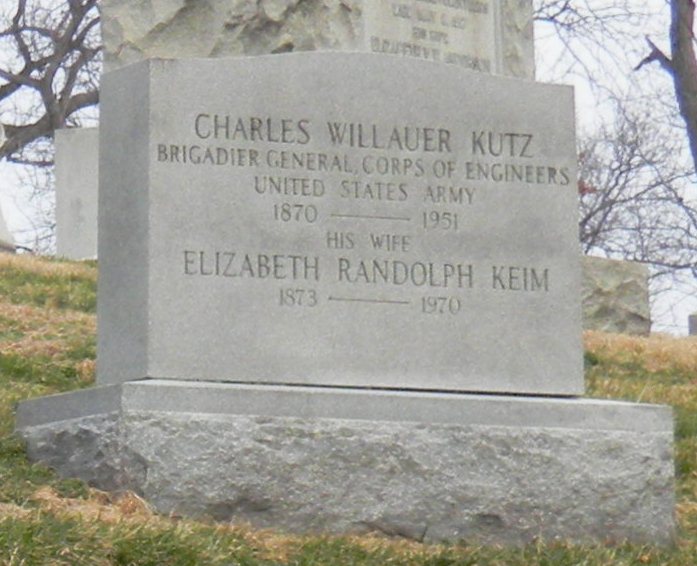As a ten-year-old boy he looked for and found means of earning money to help as he could. During his last two years of High School he had a position in the local bank at a salary of twelve dollars per month, and by the time he graduated from High School he was receiving thirty dollars per month. With the permission of his High School Principal he did his school work at night with his mother's help and was given a weekly written test by the Principal. How well he applied himself and benefitted by this unusual High School method was demonstrated by his ability to win a competitive examination for a West Point appointment, and by his record and standing at West Point. In his High School days he hoped to become an engineer but, lacking funds for college, a chance to go to West Point meant much to him.
General Kutz was married in June 1895 to Elizabeth Randolph Keim of Reading, Pennsylvania, who declined his first offer but later consented after meeting and knowing his wonderful mother. There were three children of whom he was justly very proud. The oldest is Emily Randolph, now Mrs. Wilson G. Bingham, who, with her husband Captain Bingham, retired, lives in Los Angeles; the second daughter is Marian Elizabeth, whose husband is General Lewis Tenney Ross, retired; and the third born is Colonel Charles Randolph Kutz now in Washington in the Army General Staff. There were five grandchildren and one, First Lieut. Tenney Kutz Ross, was killed in action in Korea in November 1950.
General Kutz entered the United States Military Academy at West Point in June 1889. He graduated in 1893 number two in his class. He was commissioned Additional Second Lieutenant in the Corps of Engineers and, as was the custom with Engineer graduates, went to the Engineer School of Application at Willett's Point (now Fort Totten) for the special course in Engineering, and graduated from that school in 1896. He was advanced in due course through all the military grades from second lieutenant to colonel. Prior to World War I he served at Baltimore, Md, (1896 to 1900) as assistant Engineer on fortification, river and harbor work; in a similar position from 1900 to 1901 at Portland, Maine; with the Engineer Battalion at Washington Barracks, D. C., from 1901 to 1903; as Assistant to the Chief of Engineers, Washington, from 1903 to 1906; as an instructor of Practical Military Engineering at the U. S. Military Academy, from 1906 to 1908; as District Engineer in charge of River, Harbor and Fortification work at Seattle, 1908 to 1911; as Chief Engineer, Philippines Department, 1911 to 1914; and as Engineer Commissioner, District of Columbia, until ordered to France for duty with the American Expeditionary Force. After World War I he was Division Engineer, Central Division, at Cincinnati, Ohio, from 1921 to 1928; and from 1928 to his retirement, at his own request after forty years of service, he was Department Engineers Hawaiian Department, and Commanding Officer, 3d Engineers. He was appointed Colonel, Corps of Engineers, National Army, in August 1917 and Brigadier General, National Army, in June 1918, after having served in France as Colonel of the 13th Engineer Railroad Regiment. He then served as Assistant Chief Engineer Officer, American Expeditionary Forces, and as Assistant Chief of Staff Services of Supply, at Paris, Chalons, Fleury and Tours, France, until August 1918. On his return from France he was assigned to duty at Camp Humphreys as Commanding Officer of that important Engineer Training Center.
He was decorated with the Croix de Guerre with Palm, and as an Officer of the Legion of Honor.
General Kutz’s early ambition to become an engineer found complete fulfilment, and his activities in this profession were outstanding. He was three times drafted for duty as Engineer Commissioner for the District of Columbia. His first appointment to this office was by President Wilson in 1914, but this tour was interrupted by World War I when he was recalled for service overseas with the Army. His second appointment was made by President Wilson in 1918, and he was recalled from retirement in 1941 and again made District Commissioner by President Roosevelt. His outstanding contributions to the growth and development of the District of Columbia have been cited repeatedly by the Washington press and acknowledged by many Washington leaders. In his first term he helped give direction to the newly formed Public Utilities Commission, and served as its Chairman from 1914 to 1917. During his second term he made his greatest contribution to the orderly development of Washington when he was responsible for the zoning of the City into use, area and heights districts. The numerous disputes and problems connected with this new concept were solved with his persuasive tact and quiet decision. He had intimate knowledge of every engineering project under his supervision and was well known to everyone who worked under him, for it was his daily practice to visit and inspect every project each morning, leaving his home promptly at eight o’clock for that purpose so as to reach his office by ten o’clock. He also served on the National Capital Parks and Planning Commission and on the Public Utilities and Unemployment Commissions. It is gratifying to remember that he lived to hear his fellow Washingtonians recall to him his many activities of value to the City at a dinner in his honor on November 14, 1945.
After his retirement his experience and ability were utilized continually as a consulting engineer. He was Consulting Engineer and Member of the Board of Review, Sanitary District of Chicago. He was Consulting Engineer to the Minister of Works of Venezuela for the Maracaibo Bar Commission on the matter of providing a stable and ample deep water entrance to the oil port of Maracaibo, and he made a report designed to carry out this desirable project. The plan was adopted by the Venezuelan Government but subsequent political upheavals have delayed its execution.
It was during General Kutz's tour of duty at West Point that many improvements were initiated and executed under his supervision, such as the present water supply and filtration plant, the six-inch gun battery below Trophy Point, and the restoration of old Fort Putnam.
The Class of 1893 is proud to own Charley Kutz as an outstanding member, and outstanding he was always in academic work, in sports and in military activities. He was the senior Captain of the Corps of Cadets and conscientious in all matters of discipline, but he was also just, tactful and considerate. He was much beloved and was Class President.
—K. W. W.
As a ten-year-old boy he looked for and found means of earning money to help as he could. During his last two years of High School he had a position in the local bank at a salary of twelve dollars per month, and by the time he graduated from High School he was receiving thirty dollars per month. With the permission of his High School Principal he did his school work at night with his mother's help and was given a weekly written test by the Principal. How well he applied himself and benefitted by this unusual High School method was demonstrated by his ability to win a competitive examination for a West Point appointment, and by his record and standing at West Point. In his High School days he hoped to become an engineer but, lacking funds for college, a chance to go to West Point meant much to him.
General Kutz was married in June 1895 to Elizabeth Randolph Keim of Reading, Pennsylvania, who declined his first offer but later consented after meeting and knowing his wonderful mother. There were three children of whom he was justly very proud. The oldest is Emily Randolph, now Mrs. Wilson G. Bingham, who, with her husband Captain Bingham, retired, lives in Los Angeles; the second daughter is Marian Elizabeth, whose husband is General Lewis Tenney Ross, retired; and the third born is Colonel Charles Randolph Kutz now in Washington in the Army General Staff. There were five grandchildren and one, First Lieut. Tenney Kutz Ross, was killed in action in Korea in November 1950.
General Kutz entered the United States Military Academy at West Point in June 1889. He graduated in 1893 number two in his class. He was commissioned Additional Second Lieutenant in the Corps of Engineers and, as was the custom with Engineer graduates, went to the Engineer School of Application at Willett's Point (now Fort Totten) for the special course in Engineering, and graduated from that school in 1896. He was advanced in due course through all the military grades from second lieutenant to colonel. Prior to World War I he served at Baltimore, Md, (1896 to 1900) as assistant Engineer on fortification, river and harbor work; in a similar position from 1900 to 1901 at Portland, Maine; with the Engineer Battalion at Washington Barracks, D. C., from 1901 to 1903; as Assistant to the Chief of Engineers, Washington, from 1903 to 1906; as an instructor of Practical Military Engineering at the U. S. Military Academy, from 1906 to 1908; as District Engineer in charge of River, Harbor and Fortification work at Seattle, 1908 to 1911; as Chief Engineer, Philippines Department, 1911 to 1914; and as Engineer Commissioner, District of Columbia, until ordered to France for duty with the American Expeditionary Force. After World War I he was Division Engineer, Central Division, at Cincinnati, Ohio, from 1921 to 1928; and from 1928 to his retirement, at his own request after forty years of service, he was Department Engineers Hawaiian Department, and Commanding Officer, 3d Engineers. He was appointed Colonel, Corps of Engineers, National Army, in August 1917 and Brigadier General, National Army, in June 1918, after having served in France as Colonel of the 13th Engineer Railroad Regiment. He then served as Assistant Chief Engineer Officer, American Expeditionary Forces, and as Assistant Chief of Staff Services of Supply, at Paris, Chalons, Fleury and Tours, France, until August 1918. On his return from France he was assigned to duty at Camp Humphreys as Commanding Officer of that important Engineer Training Center.
He was decorated with the Croix de Guerre with Palm, and as an Officer of the Legion of Honor.
General Kutz’s early ambition to become an engineer found complete fulfilment, and his activities in this profession were outstanding. He was three times drafted for duty as Engineer Commissioner for the District of Columbia. His first appointment to this office was by President Wilson in 1914, but this tour was interrupted by World War I when he was recalled for service overseas with the Army. His second appointment was made by President Wilson in 1918, and he was recalled from retirement in 1941 and again made District Commissioner by President Roosevelt. His outstanding contributions to the growth and development of the District of Columbia have been cited repeatedly by the Washington press and acknowledged by many Washington leaders. In his first term he helped give direction to the newly formed Public Utilities Commission, and served as its Chairman from 1914 to 1917. During his second term he made his greatest contribution to the orderly development of Washington when he was responsible for the zoning of the City into use, area and heights districts. The numerous disputes and problems connected with this new concept were solved with his persuasive tact and quiet decision. He had intimate knowledge of every engineering project under his supervision and was well known to everyone who worked under him, for it was his daily practice to visit and inspect every project each morning, leaving his home promptly at eight o’clock for that purpose so as to reach his office by ten o’clock. He also served on the National Capital Parks and Planning Commission and on the Public Utilities and Unemployment Commissions. It is gratifying to remember that he lived to hear his fellow Washingtonians recall to him his many activities of value to the City at a dinner in his honor on November 14, 1945.
After his retirement his experience and ability were utilized continually as a consulting engineer. He was Consulting Engineer and Member of the Board of Review, Sanitary District of Chicago. He was Consulting Engineer to the Minister of Works of Venezuela for the Maracaibo Bar Commission on the matter of providing a stable and ample deep water entrance to the oil port of Maracaibo, and he made a report designed to carry out this desirable project. The plan was adopted by the Venezuelan Government but subsequent political upheavals have delayed its execution.
It was during General Kutz's tour of duty at West Point that many improvements were initiated and executed under his supervision, such as the present water supply and filtration plant, the six-inch gun battery below Trophy Point, and the restoration of old Fort Putnam.
The Class of 1893 is proud to own Charley Kutz as an outstanding member, and outstanding he was always in academic work, in sports and in military activities. He was the senior Captain of the Corps of Cadets and conscientious in all matters of discipline, but he was also just, tactful and considerate. He was much beloved and was Class President.
—K. W. W.
Gravesite Details
BRIG GEN USA
Family Members
Sponsored by Ancestry
Advertisement
Advertisement
